When the rest of the world thinks of Taiwanese food, night markets and Din Tai Fung (鼎泰豐) are invariably the first establishments that come to mind. Taiwan does boast one of the most exciting street food scenes in the world, and Din Tai Fung — which actually specializes in Huaiyang cuisine from China’s eastern coast — can incite a yearning for dumplings that no other can satisfy.
These are fine as introductions, but an exploration of Taiwanese cooking that starts and ends there does the cuisine no justice. As an alternative, there are two restaurants in Taipei that I think of as one-stop shops for a deeper dive into the food of the land (and sea): Shin Yeh (欣葉) and Mountain and Sea House (山海樓).
One is a family-friendly restaurant group with a range of reliable and essential dishes familiar to any local; the other serves artful banquet-style cuisine recreated from historical sources that can delight even the most jaded.
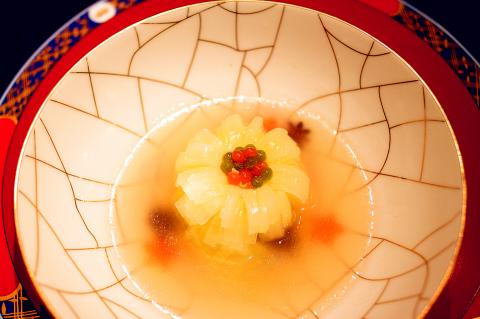
Photo: Davina Tham, Taipei Times
SHIN YEH
Shin Yeh’s first incarnation in 1977 was a back-alley restaurant, but it has since grown into a household name. Although over the years the restaurant group has developed some specialized branches that serve fine-dining and Japanese cuisine, its cornerstone remains the original restaurant line — simply named Shin Yeh — that serves homecooking-inspired fare.
Shin Yeh does have its share of luxuries, like braised whole abalone (NT$560), steamed crab with roe (NT$850), lobster (NT$180 per 37.5g) and unfortunately, despite the environmental and ethical concerns around shark finning, a handful of shark’s fin dishes. An unorthodox showstopper is the mountain of glistening, addictively crunchy dried scallop and potato shards fried to a golden crisp (NT$1,050).
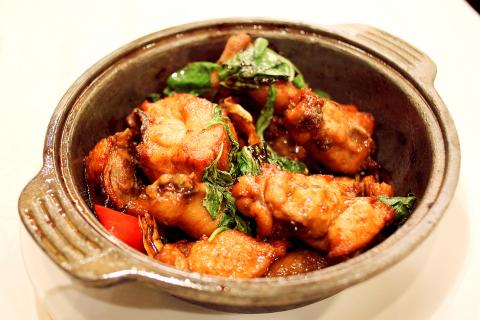
Photo: Davina Tham, Taipei Times
There are also decent renditions of the usual suspects like sweet-and-salty “three cups” chicken (NT$680), steamed pork meatballs with salted egg (NT$225) and soy-braised pig’s trotter (NT$300). But I’ve found that the humblest dishes make the most impact.
An unfussy bowl of stir-fried vermicelli with julienned pumpkin (NT$200) packs a whallop of garlic and umami into each al dente strand of noodle. Preserved radish omelette (NT$210) is a straightforward, well-executed version of the homely dish, with a mild fermented funk. Soy-braised pork over rice (NT$120), with a cube of whole pork belly, is a particularly hearty version, serving up more meat than the street version that’s heavy on lard. These dishes may be common, but Shin Yeh’s on-point delivery of flavor every single time is rare.
The array of options means that Shin Yeh does double duty as a banquet restaurant for a traditional birthday feast, as well as an easy weeknight dinner spot. That might explain its evergreen popularity with locals — reservations are recommended, especially on the weekends.
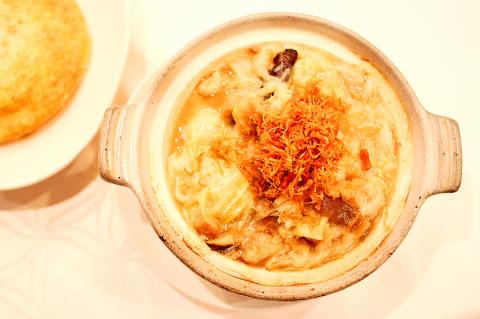
Photo: Davina Tham, Taipei Times
■ Shin Yeh (欣葉), various locations in Taipei; more information at: bit.ly/32OMpjm
MOUNTAIN AND SEA HOUSE
Going from Shin Yeh to Mountain and Sea House is a bit like moving from a freshman 101 class right into a graduate seminar, but exponentially more delicious.
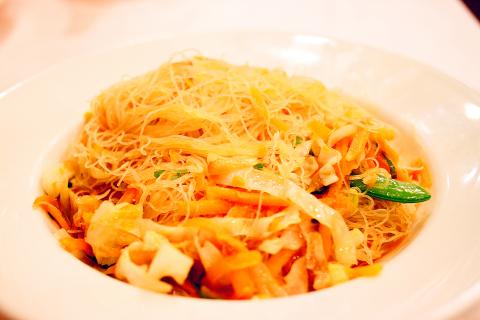
Photo: Davina Tham, Taipei Times
Though only five-years-old, Mountain and Sea House has set itself the lofty task of reconnecting diners to Taiwan’s terroir and history through meticulously researched recipes and techniques executed with local ingredients.
This often involves tracking down specific renditions of a dish and learning from the old hand that makes it, as was the case with a sweet almond milk that my server says the chef’s team learned from an octogenarian in Yilan. The dessert turns out to be my favourite dish of the night — familiar and comforting, without any of the cloying greasiness that fails other versions I’ve had.
The restaurant pays homage to Taiwan’s 1920s and 1930s banquet-style cooking that flourished into the mid-20th century before declining in popularity. The food is built on a backbone of recipes passed down to creative director Tsai Jui-lang (蔡瑞郎) from 84-year-old masterchef Huang Te-hsing (黃德興).
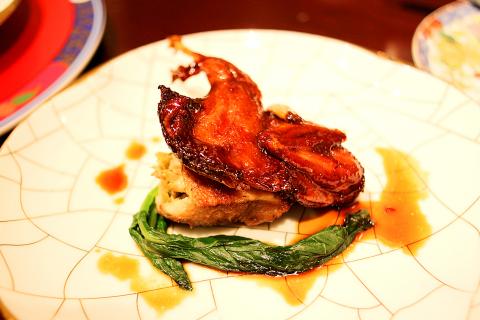
Photo: Davina Tham, Taipei Times
The nostalgia seeps into the furnishings and even the china, all modeled after a Taisho-era banquet hall. All of these efforts paid off handsomely when Mountain and Sea House acquired its first Michelin star this year.
As a banquet-style restaurant, a la carte dishes are portioned for a sizeable group, so service staff will nudge groups of four or less toward individual meal sets. At dinner, the nine-course sets start at NT$1,980 and go up to NT$4,680. Lunch sets start lower, from NT$980 on weekdays. The high prices are reflected back in the artistry on the plate.
Sets vary seasonally, but a platter of cold appetizers starts each one in largely the same way, bringing together the love-it-or-hate-it dried mullet roe and some less polarizing bites, like smoked chicken, kaoliang sausage and a squid ring filled with egg three ways.
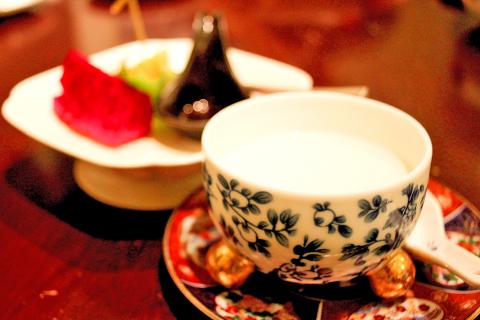
Photo: Davina Tham, Taipei Times
The restaurant shares a parent company with local organic grocer Green and Safe, so much of the produce comes from the same Nanao Fengyuan Farm (南澳豐園農場) in Yilan. Ingredients are treated with great care and skill. When my roasted squab arrives, I gnaw it down to the bone and then also try to eat the bone, at least the crispy bits, since every part of the bird is intensely flavorful.
If you’re literate in Chinese, the menu reads like poetry and adds to the banquet experience, where presentation and meaning are as important as flavor. A dish with a name that translates as “dewdrops on flowers in one’s hair” is a chicken and mushroom meatball inside a carved cucumber, sitting in chicken consomme. “Phoenix eye abalone” is named for the shape of the mollusc as it sits on a bright yellow bed of egg custard.
That said, some dishes were a little underwhelming, such as the deep-fried flatfish spring roll and stir-fried vermicelli with dried seafood. And I can’t comment on the restaurant’s signature dishes of suckling pig (NT$3,280, NT6,650 or NT$9,980) and stuffed whole chicken stewed in pig’s stomach (NT$4,800), which need to be ordered three and two days in advance respectively. They can also be sampled as part of the higher-priced set meals.
But as far as faithful reproductions of traditional Taiwanese cuisine goes, Mountain and Sea House is in a class of its own. My only hope is that, given all the fieldwork and first-hand interactions with masterchefs in the name of recipe development, the restaurant can find a way to bring more of those stories into the dining experience.
■ Mountain and Sea House (山海樓), 94, Renai Rd Sec 2, Taipei City (台北市仁愛路二段94號); Daily, 11:30am to 2:30pm and 5:30pm to 10pm; tel: (02) 2351-3345

William Liu (劉家君) moved to Kaohsiung from Nantou to live with his boyfriend Reg Hong (洪嘉佑). “In Nantou, people do not support gay rights at all and never even talk about it. Living here made me optimistic and made me realize how much I can express myself,” Liu tells the Taipei Times. Hong and his friend Cony Hsieh (謝昀希) are both active in several LGBT groups and organizations in Kaohsiung. They were among the people behind the city’s 16th Pride event in November last year, which gathered over 35,000 people. Along with others, they clearly see Kaohsiung as the nexus of LGBT rights.

Jan. 26 to Feb. 1 Nearly 90 years after it was last recorded, the Basay language was taught in a classroom for the first time in September last year. Over the following three months, students learned its sounds along with the customs and folktales of the Ketagalan people, who once spoke it across northern Taiwan. Although each Ketagalan settlement had its own language, Basay functioned as a common trade language. By the late 19th century, it had largely fallen out of daily use as speakers shifted to Hoklo (commonly known as Taiwanese), surviving only in fragments remembered by the elderly. In

Dissident artist Ai Weiwei’s (艾未未) famous return to the People’s Republic of China (PRC) has been overshadowed by the astonishing news of the latest arrests of senior military figures for “corruption,” but it is an interesting piece of news in its own right, though more for what Ai does not understand than for what he does. Ai simply lacks the reflective understanding that the loneliness and isolation he imagines are “European” are simply the joys of life as an expat. That goes both ways: “I love Taiwan!” say many still wet-behind-the-ears expats here, not realizing what they love is being an

In the American west, “it is said, water flows upwards towards money,” wrote Marc Reisner in one of the most compelling books on public policy ever written, Cadillac Desert. As Americans failed to overcome the West’s water scarcity with hard work and private capital, the Federal government came to the rescue. As Reisner describes: “the American West quietly became the first and most durable example of the modern welfare state.” In Taiwan, the money toward which water flows upwards is the high tech industry, particularly the chip powerhouse Taiwan Semiconductor Manufacturing Co (TSMC, 台積電). Typically articles on TSMC’s water demand